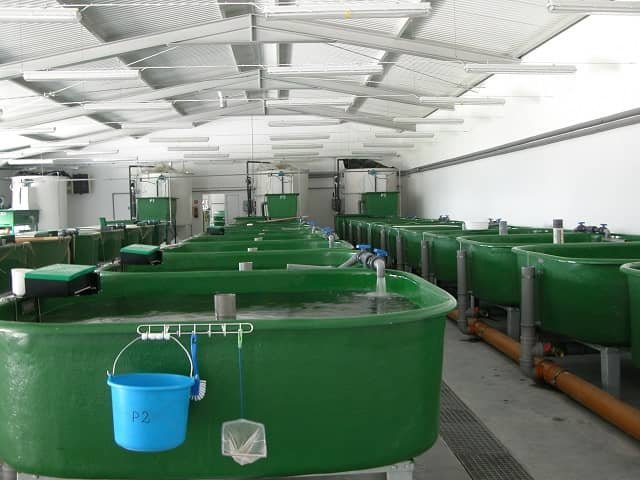
The global appetite for fish and seafood continues to grow, and Recirculating Aquaculture Systems (RAS) offer a promising solution for sustainable fish farming. However, the adoption of RAS has been slow due to high costs and energy demands. This is where cutting-edge artificial intelligence (AI) comes into play.
Scientists at the University of Waterloo present a novel economic operation scheme for Recirculating Aquaculture Systems (RAS), consisting of a moving horizon estimator and an Economic Model Predictive Controller (EMPC), which help make economically optimal decisions for RAS.
RAS Optimization with AI
Researchers are exploring how to use AI to make RAS operations more profitable and sustainable. In this regard, the study introduces an innovative approach that combines artificial intelligence (AI) with RAS engineering. The system utilizes two key components:
- Moving Horizon Estimator: This AI tool acts as an intelligent sensor, continuously analyzing data and estimating any uncertainty within the RAS, such as fluctuations in oxygen levels or water temperature.
- Economic Model Predictive Controller (EMPC): This AI brain of the system takes the estimated data and predicts the most cost-effective course of action for the RAS. It considers factors such as maximizing fish growth, minimizing energy usage (aeration, etc.), and ensuring optimal water quality.
Existing control systems in RAS often focus on individual factors such as oxygen levels or temperature. EMPC takes a more holistic approach, considering factors like:
- Fish growth: Optimization of conditions for healthy fish growth, maximizing production.
- Utility costs: Minimizing energy and resource usage to reduce operational expenses.
This research proposes an innovative EMPC scheme that addresses these limitations:
- Comprehensive economic optimization: Considers both fish production and utility costs, providing a complete picture of financial performance.
- Model uncertainty management: The system can account for unexpected changes and adjust accordingly, ensuring robust performance.
- Minimal required measurements: EMPC uses readily available data, eliminating the need for expensive additional sensors.
Real-world Results
Researchers tested the EMPC scheme on a simulated rainbow trout farm. They compared its performance with existing control systems during two challenging scenarios:
- Aerator failure: EMPC successfully adjusted operations to maintain water quality and fish health even when an aerator failed.
- Temperature disturbance: When unexpected temperature fluctuations occurred, EMPC adapted the system to minimize energy usage while still maintaining an ideal environment for the fish.
Compared to traditional control methods, the EMPC system produced impressive results:
- Up to 41% improvement in process economics: EMPC made smarter resource allocation decisions, resulting in significant cost savings.
- Shorter batch times by up to 22%: Fish reached optimal size faster, leading to quicker harvests and higher overall productivity.
- Exceptional uncertainty handling: Even with incomplete data, the EMPC system performed remarkably well, with parameter estimates typically within 5% of actual values.
These findings demonstrate that the EMPC system can significantly enhance the economic viability and efficiency of RAS. This translates not only into healthier fish but also into a more sustainable and profitable future for the aquaculture industry.
Impact on RAS Management
This innovative EMPC system offers several advantages for the aquaculture industry:
Stay Always Informed
Join our communities to instantly receive the most important news, reports, and analysis from the aquaculture industry.
- Increased profitability: By optimizing resource usage, EMPC can significantly reduce operational costs.
- Improved fish health: Precise control of water quality and temperature leads to healthier fish populations.
- Reduced environmental impact: Lower energy consumption minimizes the environmental footprint of RAS.
- Automated efficiency: EMPC automates many control tasks, freeing up valuable time for aquaculture management.
Conclusion
With EMPC at the helm, RAS technology has the potential to become a more sustainable and cost-effective solution for the future of blue food production.
The research paves the way for widespread adoption of AI-driven RAS. By optimizing resource utilization and reducing waste, EMPC systems can contribute to a more sustainable and environmentally friendly approach to aquaculture. As the technology matures, we can expect even more innovative AI applications that will revolutionize the aquaculture industry.
The study was funded by the Natural Sciences and Engineering Research Council of Canada (NSERC).
Contact
Luis Ricardez-Sandoval
Department of Chemical Engineering, University of Waterloo
Waterloo, ON, Canada N2L 3G1
Email: laricard@uwaterloo.ca
Reference (open access)
Patrón, G. D., & Ricardez-Sandoval, L. (2024). Economically optimal operation of recirculating aquaculture systems under uncertainty. Computers and Electronics in Agriculture, 220, 108856. https://doi.org/10.1016/j.compag.2024.108856
Editor at the digital magazine AquaHoy. He holds a degree in Aquaculture Biology from the National University of Santa (UNS) and a Master’s degree in Science and Innovation Management from the Polytechnic University of Valencia, with postgraduate diplomas in Business Innovation and Innovation Management. He possesses extensive experience in the aquaculture and fisheries sector, having led the Fisheries Innovation Unit of the National Program for Innovation in Fisheries and Aquaculture (PNIPA). He has served as a senior consultant in technology watch, an innovation project formulator and advisor, and a lecturer at UNS. He is a member of the Peruvian College of Biologists and was recognized by the World Aquaculture Society (WAS) in 2016 for his contribution to aquaculture.




